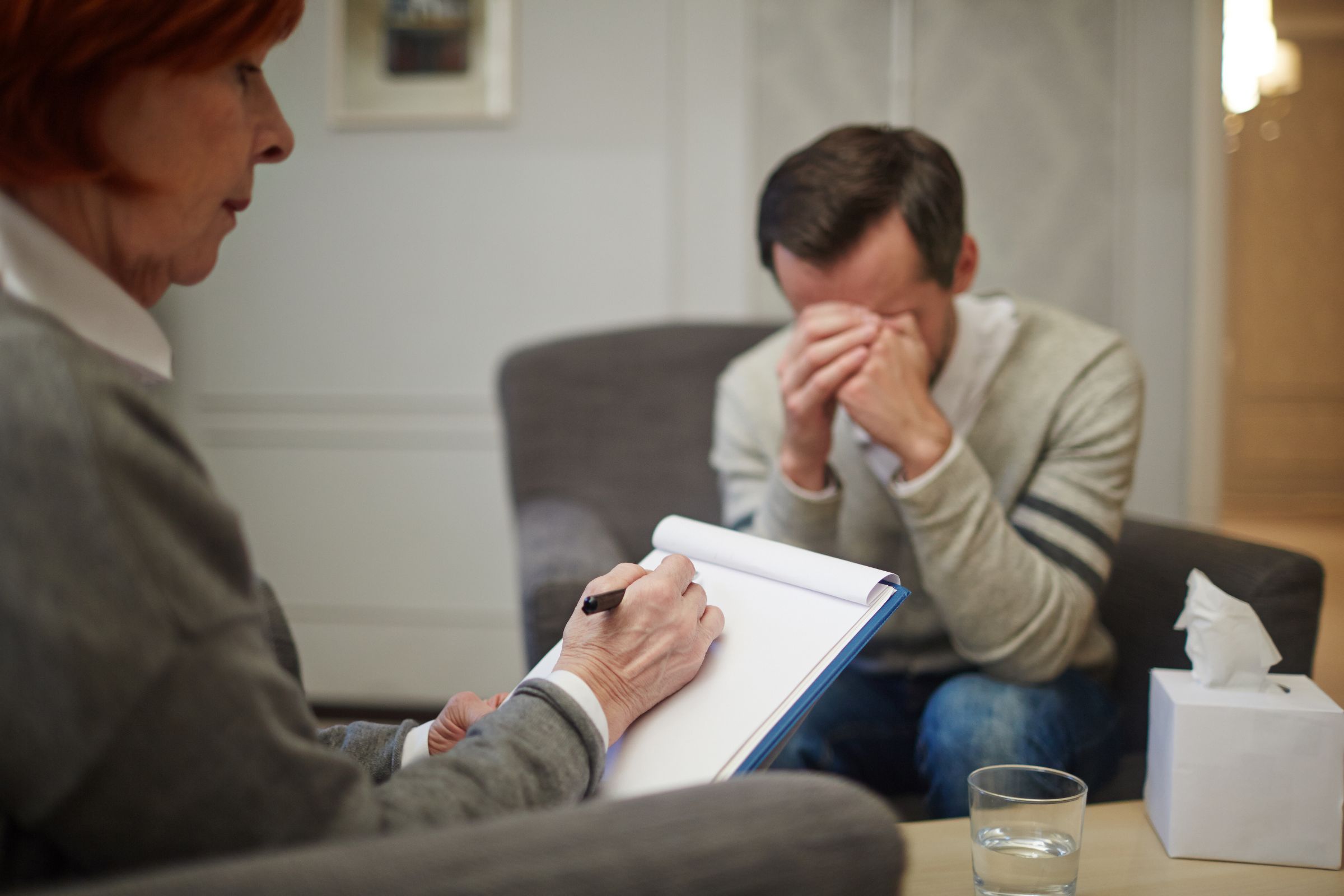It is undeniable that a mother will always seek the best for her children . She is always there for them, attending to her needs and devoting her time and energy to them. However, this unconditional love and protection can become too strong a bond, making it difficult for children to break away and forge their own path. This is how the dreaded " Mama's son syndrome " arises.
This expression is used to describe those men who are completely dependent on their mother . They don't make decisions for themselves and do everything they can to keep her happy, even if it means going against her partner or neglecting her own well-being.
If you feel identified with this description, you may always need your mom's approval and advice in every step you take. In your relationship, it can seem like three people, since your mother always has an opinion to express. You are constantly willing to follow orders and comply with your mom's requests, even if it means sacrificing yourself or putting your own needs on the back burner.
Today we want to explore in depth the Oedipus syndrome , its triggers and the consequences it can have on your life. In addition to providing valuable practical advice to free yourself from this pattern of behavior and develop greater autonomy.
It is important to remember that you are not alone in this challenge. Many people have experienced the Oedipus syndrome and have found effective ways to overcome it. By acknowledging and addressing this issue, you will be able to begin a journey of self-discovery and personal growth.
If you are ready to free yourself from the emotional "umbilical cord" and live a more autonomous and balanced life, join us on this journey of self-discovery and overcoming mommy's son syndrome. Together, we will explore the keys to break this dynamic and open up to new opportunities for personal growth and healthy relationships.
What is the Oedipus syndrome?
The Oedipus syndrome is a psychological concept that originates from the psychoanalytic theory of Sigmund Freud and has been widely debated and studied in the field of psychology. It refers to a period of child development in which the child experiences complex and contradictory feelings towards her parent.
During this stage, which generally occurs between 3 and 6 years of age, the child feels an intense attraction and attachment to the parent of the opposite sex, in this case, the mother. At the same time, a rivalry and envy develops towards the same-sex parent, the father. These feelings can be perceived unconsciously and do not necessarily imply a real sexual desire, but rather reflect a search for attention, love and recognition.
It is important to note that the Oedipus syndrome is considered a normal stage of child development . As the child grows and emotionally matures, he overcomes these conflicts and establishes identification with the same-sex parent, which facilitates the construction of her identity and the establishment of healthy relationships in the future.
However, in some cases, these feelings can persist into adulthood, giving rise to the so-called "mama's son" syndrome . In these situations, the individuals maintain an excessive emotional dependence on their mother and have difficulties establishing balanced relationships with other people, especially in the field of partner relationships.

What are the factors that trigger the Oedipus syndrome?
The Oedipus syndrome can be triggered by different factors that influence family dynamics and the formation of children's identity. Here is a list of common factors that can contribute to the development of this syndrome:
- Maternal overprotection : When a mother overprotects her child, cares for him excessively and meets all his needs without allowing him to develop his autonomy, it can generate emotional dependence and difficulties in establishing healthy relationships in the future.
- Absence or weakness of father figures : The lack of a father figure present or a weakened relationship with the father can affect the balance in the child's relationship with both parents. This can generate a greater identification with the mother and a more intense rivalry towards the father.
- Conflicting situations in the family environment : The unfavorable family environment, marked by constant conflicts between parents or by the presence of emotional tensions, can influence the way in which the child perceives and relates to his parents. These conflictive situations can fuel feelings of rivalry and envy, increasing the intensity of the Oedipus syndrome.
- Masked maternal relationships : If the mother uses the child to meet her own emotional needs, treats him as a confidant or partner rather than a child, it can lead to role confusion and unhealthy emotional dependency.
- Lack of limits and clear rules : The absence of limits and rules in parenting can hinder the development of autonomy and the ability to make their own decisions. This can contribute to excessive dependence on the mother and difficulty establishing personal limits.
What are the consequences of the Oedipus syndrome?
The Oedipus syndrome can have various consequences in a person's life if it is not resolved properly. Here is a list of some of the possible consequences:
- Difficulties in couple relationships : People who experience the Oedipus syndrome in adulthood may have difficulties establishing balanced couple relationships. They may manifest excessive emotional dependence on their partner and constantly seek approval and care, thus replicating the dynamics of their relationship with their mother.
- Low self-esteem and constant search for approval : The Oedipus syndrome can influence the formation of self-esteem. People who fail to adequately overcome this syndrome may develop low self-esteem, as their sense of self-worth may depend heavily on their mother's approval and recognition.
- Difficulty Setting Personal Boundaries : Individuals experiencing the Oedipus syndrome may have difficulty setting clear personal boundaries. They may find themselves in situations where they feel compelled to constantly meet their mother's demands and expectations, even at the expense of their own needs and desires.
- Excessive emotional dependence on the mother : The Oedipus syndrome can generate an unhealthy emotional dependence on the mother in adulthood. These individuals may experience difficulty making decisions without their mother's approval or advice, constantly seeking her guidance and validation.
- Rivalry or envy towards the father or male figures in general : In the Oedipus syndrome, rivalry and envy develops towards the same-sex parent. This can generate internal conflicts and difficulties in the relationship with the father, as well as in relationships with male figures in general.

How do I know if I'm a "mama's boy"?
If you're wondering if you're a "mama's boy," here are some signs that may indicate you have this dynamic in your life:
- Excessive emotional dependence on your mother : If you feel that you are emotionally dependent on your mother excessively, that is, that you constantly need her approval and support to make decisions or face situations of daily life, you may be experiencing the Oedipus syndrome.
- Difficulty making decisions without your mother's approval or advice : If you feel that you cannot make important decisions for yourself without first consulting your mother and getting her approval or advice, this may be a sign that you have a dependency. emotional towards her.
- Low autonomy and difficulty establishing personal limits : If you find it difficult to establish personal limits and defend your individuality, that is, if you have difficulty saying "no" when necessary and feel obligated to constantly meet your mother's expectations and demands , this may be indicative of a "mama's son" dynamic.
- Rivalry or envy towards your father or male figures in general : If you feel rivalry or envy towards your father or other male figures in your environment, this may be a manifestation of the conflict typical of the Oedipus syndrome.
- Difficulty establishing balanced couple relationships : If you have difficulties establishing balanced couple relationships, in which you can share responsibilities, make joint decisions and maintain an adequate level of autonomy and independence, it is possible that the Oedipus syndrome is influencing your dynamics relational.
- Low self-esteem and constant search for approval : If you have low self-esteem and constantly need the approval and validation of your mother (or mother figures in general), this can be a sign that you have an emotional dependence on her and seek her approval as a main source of your personal value.

How can I overcome the Oedipus syndrome?
If you have identified with the signs of being a "mama's son" and want to overcome the Oedipus syndrome, here are some practical tips that can help you in this process:
- Recognize and accept the Oedipus syndrome : The first step in overcoming any problem is to be aware of its existence. Recognize that your excessive dependence on your mother and difficulties in setting limits are part of the Oedipus syndrome. Accept that this may be affecting your relationships and personal well-being.
- Seek therapeutic support : Consider the possibility of seeking professional support through psychological therapy. A psychologist or therapist specializing in family relationships and personal development will help you explore and understand the roots of your emotional dependency and provide you with tools to overcome it.
- Cultivate your autonomy : Work on developing your autonomy and ability to make decisions for yourself. Practice making small decisions without relying on your mother's approval. As you feel more secure in your ability to decide, you will be able to set limits and develop greater emotional independence.
- Establish Balanced Relationships : Work on establishing balanced relationships with your mother and with other important people in your life. Recognize that having a healthy relationship involves respecting your own needs and limits, as well as those of others. Look for ways to communicate assertively and establish mutual agreements.
- Encourage your personal growth : Dedicate time and energy to your own personal growth. Explore your interests, develop your skills, and pursue goals and objectives that motivate you. By focusing on your own development, you will become emotionally stronger and may reduce your emotional dependence on your mother.
- Practice self-care : Learn to take care of yourself properly. Spend time doing activities that you like and make you feel good. Establish self-care routines that include exercise, adequate rest, healthy eating, and time to relax. The more you take care of and value yourself, the less you will depend on external approval.
Remember that overcoming the Oedipus syndrome can take time and effort. Be patient with yourself and celebrate every little breakthrough you make. The goal is to develop a healthy relationship with your mother and foster your own personal growth and emotional independence.





Comentarios